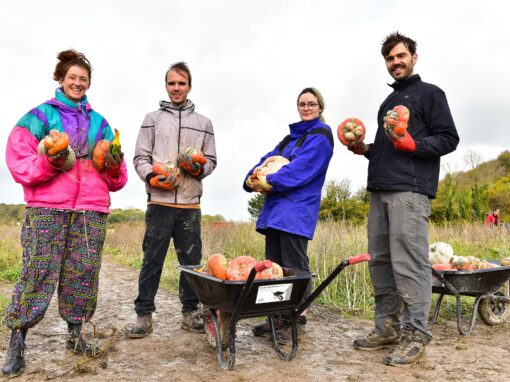
FFT outside the Supreme Court alongside London Gypsies and Travellers and Derbyshire Gypsy Liaison Group before acting as Appellants to tackle anti-Traveller ‘wide injunctions’. February 2023.
In a landmark ruling, the Supreme Court recognised that anti-Traveller wide injunctions have a negative impact on the ability of Gypsies and Travellers to live a traditionally nomadic way of life and, as a result of the campaign, has severely restricted their use.
The Campaign
Anti-Traveller wide injunctions against “persons unknown” have frequently been used by councils in England to prevent Gypsies and Travellers from stopping on public land since 2015. This is despite the majority of councils failing to identify land for sites and stopping places, leaving families with little or no option about where to stop and rest.
In 2023, Friends, Families and Travellers challenged the use of anti-Traveller wide injunctions in the Supreme Court as the last stage of legal proceedings, after acting as interveners in the High Court and Court of Appeal.
Working alongside other groups, including Derbyshire Gypsy Liaison Group (DGLG) and London Gypsies and Travellers (LGT), they fought to protect the right to pursue the nomadic way of life, while highlighting the discrimination and racism Gypsies and Travellers face.
We are delighted to be recognised by SMK for our work in challenging widespread discriminatory practices against nomadic Gypsies and Travellers. It is increasingly vital that organisations like us are able to punch above their weight in the legal sphere and be recognised – we hope that this is only the beginning in tackling deeply embedded systemic issues.”
Sarah Mann, CEO of Friends, Families and Travellers
We are delighted to be recognised by SMK for our work in challenging widespread discriminatory practices against nomadic Gypsies and Travellers. It is increasingly vital that organisations like us are able to punch above their weight in the legal sphere and be recognised – we hope that this is only the beginning in tackling deeply embedded systemic issues.”
Sarah Mann, CEO of Friends, Families and Travellers
The Change
Despite challenging wide injunctions in the High Court and Court of Appeal, councils were continuing to utilise the injunctions against nomadic Gypsies and Travellers, but with the support of a committed legal team, they persevered.
After being granted permission to appeal the Court of Appeal’s decision (taking the case to the Supreme Court), a protective costs order (PCO) was issued, which allowed them to pursue a public interest case without the risk of unaffordable costs.
The Supreme Court considered that newcomer injunctions were an equitable remedy that ought to be available, in appropriate cases, where other remedies available are inadequate to vindicate or protect the rights in issue.
However, importantly, the impact that these injunctions had on the ability of Gypsies and Travellers to live a traditionally nomadic way of life was recognised, highlighting the continuing lack of site provision.
Although their appeal was ultimately rejected, the Supreme Court recognised the issues laid out in their argument and severely restricted the use of wide injunctions as a result.
This is an extremely important challenge for Gypsies and Travellers who have no choice but to resort to staying on roadside camps.
The Future
The Supreme Court issued a Protective Costs Order (PCO) so that undertaking the case would come at no financial cost for the organisations, potentially providing an important blueprint. Although their appeal was ultimately rejected, the addition of a PCO was a novel feature of the case and the campaign trod new ground, making it increasingly accessible for small groups and organisations to change the law without a financial deterrent.
This is just one of the many prohibitive approaches and eviction powers used to target Gypsies and Travellers. It’s key that the Supreme Court recognises the significance of the lack of site provision and the need for ”compelling justification” for such an order to be sought and granted by the Court.
It is a shot across the bow to local authorities, showing that their hostile approaches to nomadic life will not go unchecked.
Who else was involved?
FFT, LGT and DGLG were represented by Chris Johnson of Community Law Partnership (CLP), Marc Willers KC, Tessa Buchanan and Owen Greenhall of Garden Court Chambers, and Richard Drabble KC of Landmark Chambers. Liberty and Friends of the Earth acted as Interveners in the case.


